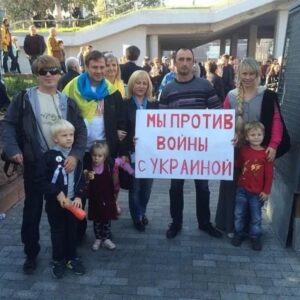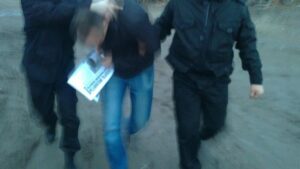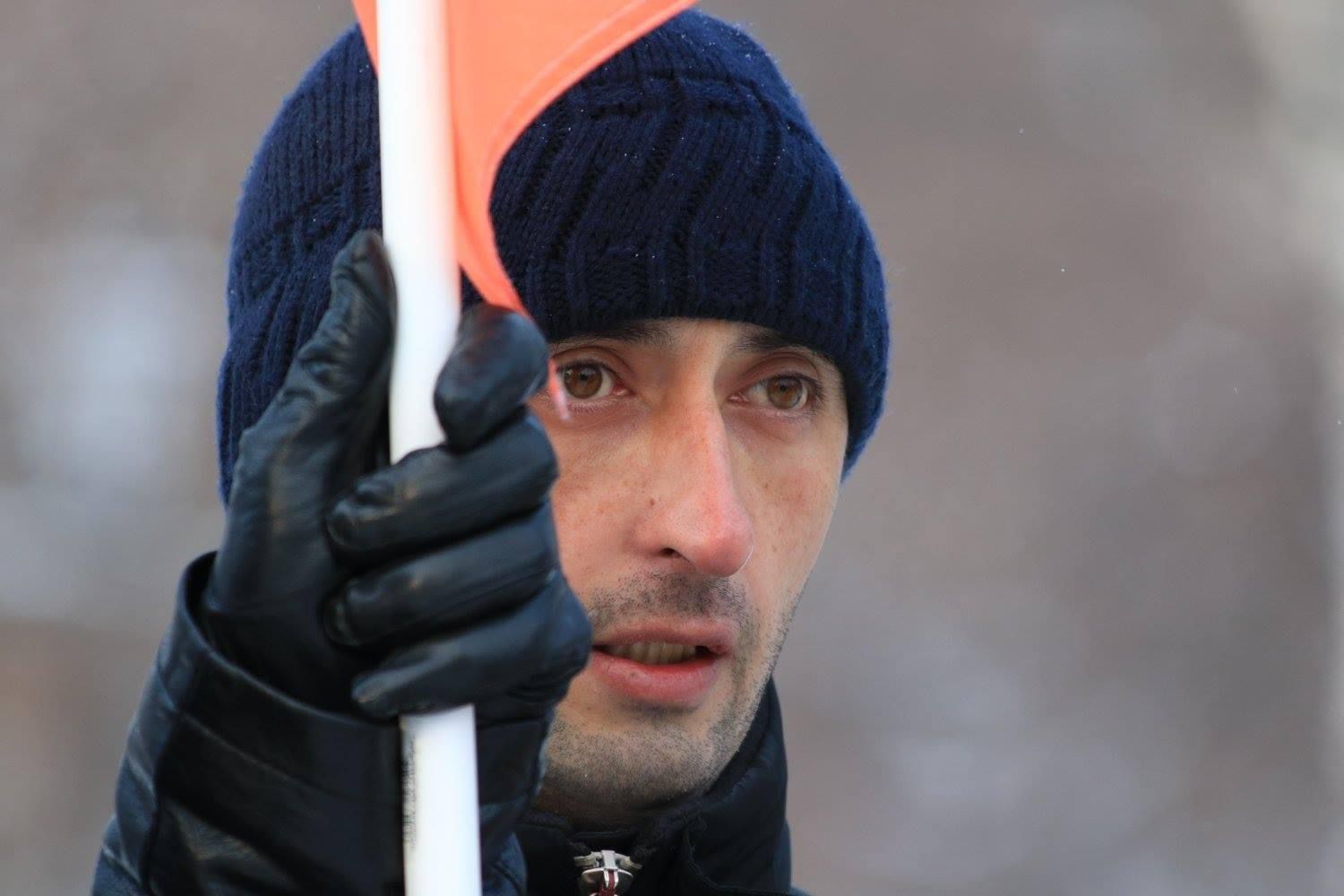Russian President Vladimir Putin’s onslaught on dissent intensified after his invasion of Ukraine in 2022. This article is part of Dissent Today’s special series documenting the past and present struggles of exiled Russian dissidents who sought political asylum in the U.S. in recent years.
Mikhail Savostin In exile since: 2021 Targeted for: Organizing and attending protests against Putin
In 2019, when Mikhail Savostin, an anti-Putin activist, was released after spending more than a year in a Russian prison in the southwestern city of Stavropol on dubious charges of marijuana possession, he realized that he was no longer strong enough to fight the regime. Having faced multiple arrests, torture and experienced a hunger strike in jail, his health had deteriorated. Finally, in August of 2021, Savostin, now 47, left Russia for Cyprus, hoping to win political asylum and start a new life.
The sense of safety he felt after arriving in Cyprus was short-lived, as he began receiving threats less than a year later for his online criticism of the 2022 Russian invasion of Ukraine. One morning, as he left his home, he was shocked to see what he described as a “warning” from Russian authorities. A poster had appeared in the city of Limassol, featuring black-and-white photos of prominent Russian dissidents based in Cyprus who had been critical of the Ukraine war, including Savostin. The poster included mourning ribbons and funeral lamps, implying that the individuals depicted were deceased. According to local media, some of these individuals were questioned by the Cyprus police prior to the emergence of the mysterious poster. While Savostin does not know who was behind this act, he believes it was a death threat issued by the Russian authorities as a result of his anti-Putin posts on social media, where he commands a significant following.
After the invasion of Ukraine in February 2022, the Russian government intensified its crackdown on dissent. The authorities began actively targeting those who criticized the war. Within two weeks of the start of the war, at least 150 journalists were said to have fled Russia. In March of 2022, President Putin enacted a series of new laws criminalizing criticism of the invasion or the Russian army, making dissent even more dangerous.
Savostin was still awaiting a decision on his asylum application in Cyprus when he saw his photo on the poster, and news reports about critics of the war being persecuted added to his fears. In April of 2023, his asylum application was denied by Cyprus, prompting him to flee to the United States through the Mexico border, where he succeeded in getting asylum a month later.
According to Savostin, the authorities in Cyprus facilitate the Putin regime’s crackdown on dissidents by refusing to protect individuals seeking refuge in the country. He believes this is why he was denied asylum despite having a strong case.
Savostin worked as an activist in Russia for more than 20 years, during which time he also ran for government offices. He was once a candidate for deputy in the regional Duma (the lower house of the Federal Assembly of Russia).

Due to his activism, Savostin was jailed twice. The first time was in 1999, when he organized rallies against the alleged exploitation of low-wage workers, and he served a year in prison. Later, in 2018, he was jailed for attending a protest in Stavropol against Putin’s reelection.
In 2019, the jail doctors misdiagnosed him with lung cancer, which turned out to be a blessing in disguise because the authorities released him and suspended his three-year sentence, believing he was going to die. “It was a mild illness, but they thought I was dying,” he said. “They didn’t want to be blamed for my death.”
After his release, he no longer had the energy to continue being chased by the police. He resumed some of his less risky activism work but decided to maintain a low profile—a far cry from his pre-arrest life. “I did not want to go to jail again. I have faced the worst conditions,” he told Dissent Today over a Zoom call from his place of residence in Minneapolis, Minnesota. “From torture to isolation, I was targeted as if I were one of the country’s most dangerous enemies.”

Savostin now lives in Minneapolis, where a Russian opposition group helped him find temporary housing. He had been active in political and activist circles back home, but is currently unemployed as he waits for his work authorization. “Not having a job makes it even harder to cope with the loneliness you experience after being detached from your country and your people,” he says.
Savostin has an 18-year-old son who is still in Russia and will soon have to enlist in the military for mandatory service. “I wanted to bring him to the U.S. before he turned 18 so that he does not have to participate in the Russian military’s war crimes,” he says.
But Savostin has received little support from human rights organizations in the U.S. in his efforts to bring his son to the country. He is relying on activist groups in Russia that are trying to move to America to bring his son along with them.
He was active on social media until recently; however, Savostin has now toned down his online activism and no longer writes or shares anything critical of Putin, fearing that his son might be targeted as a result.
“This self-censorship is part of my new identity,” he says. “There was a time when I was determined to keep speaking out against Putin’s crimes regardless of the consequences. But now, I don’t have it in me to fight this battle. I don’t want my son to suffer because of me.”
Savostin’s now ex-wife wanted him to return to Russia from Cyprus and assure the authorities that he had given up his activism, in order to guarantee the family’s safety. “But returning to Russia would have meant presenting myself for yet another jail term,” he said. Due to their disagreement on this matter, Savostin’s wife sought a divorce, and the couple parted ways.
As he waits for his work authorization, which has been delayed for over two weeks now, Savostin wonders if he will ever be able to truly adjust to life in the U.S. He does not speak English, which makes it harder to navigate the American immigration system and life in general.
“The way they are delaying the process of issuing the work permit makes me question why they allow us to enter the U.S. in the first place if they do not have the resources to help us adjust,” he says.

The writer is a journalist and the Founding Editor of Dissent Today. She covers politics, human rights, and religious extremism. She tweets at @AiliaZehra.

